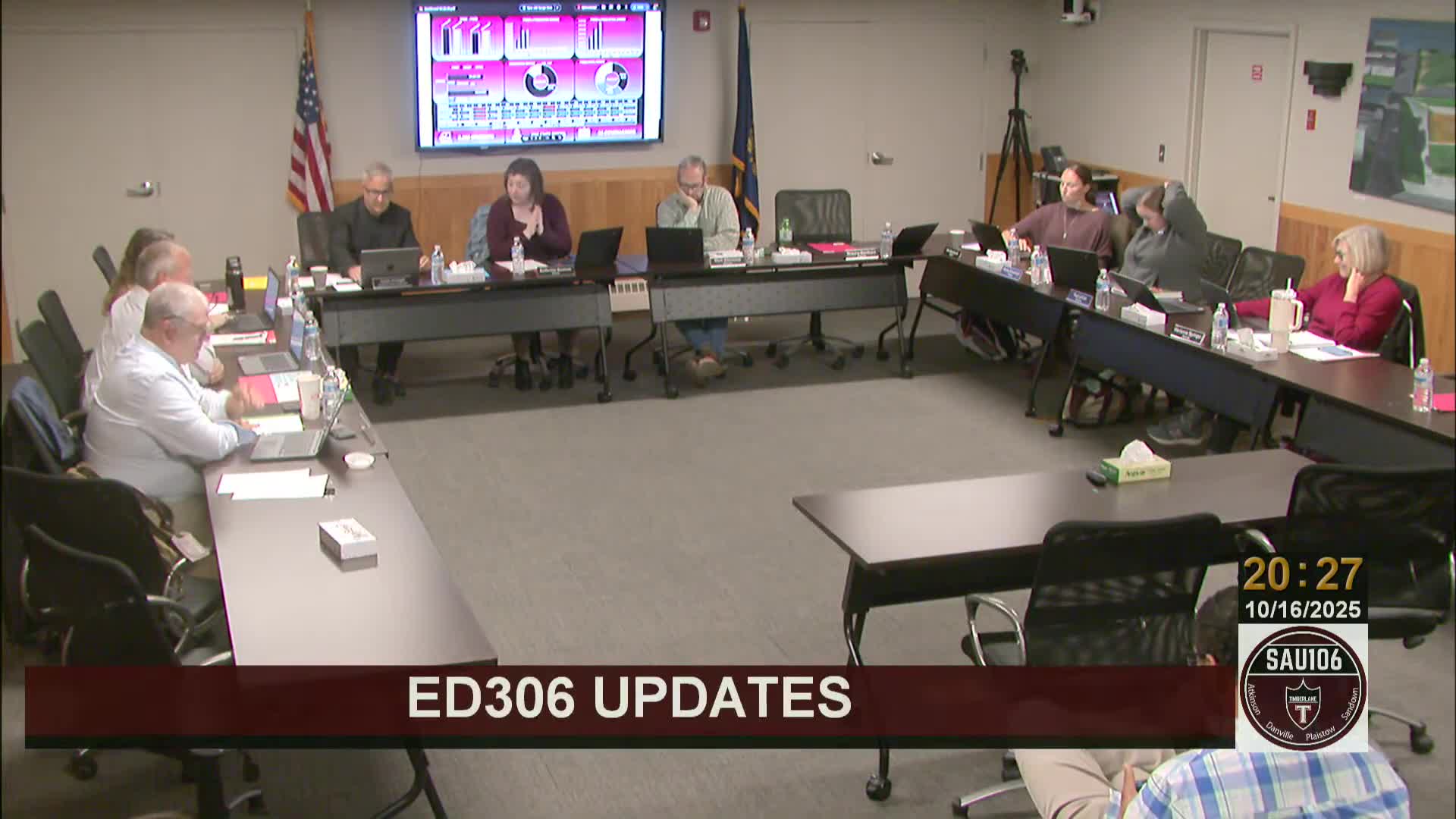Administrators outline ED 306 competency‑based shift; board approves first reads of linked policies
Get AI-powered insights, summaries, and transcripts
Subscribe
Summary
District administrators told the Timberlane school board that New Hampshire’s revised ED 306 rules will require the district to change how it awards high‑school credit and to revise multiple policies. The board approved first reads of related policy language and asked administrators for a schedule of policy updates and implementation plans.
District administrators told the Timberlane school board that New Hampshire’s revised ED 306 rules will require the district to change how it awards high‑school credit and to revise multiple policies. The board approved first reads of related policy language and asked administrators for a schedule of policy updates and implementation plans.
Sandy, the district administrator who led the presentation, said the state’s revisions to minimum standards for public school approval (ED 306) take effect July 1, 2026, and for incoming high‑school freshmen that same date will govern the courses and credits that meet minimum state approval. Sandy framed the change as a statewide shift away from ‘‘seat time’’ and percentage grades toward competency‑based credit: under the new rules, awarding credit is tied to demonstrated proficiency on defined competencies rather than to attendance and a passing percent grade.
Sandy described new and expanded pathways students can use to earn competencies: extended learning opportunities (ELOs), portfolios, internships and other career‑related experiences, summer learning, and the state’s ‘‘Learn Everywhere’’ program, which consists of State Board‑approved outside programs that if completed will require local districts to accept the issued certificate for credit. The presentation noted that for Learn Everywhere courses the state requires the district to accept at least one‑third of a student’s credits from approved external programs, and that students may petition local school leadership to accept a larger share in specific cases.
Sandy provided a table of minimum high‑school credit changes in ED 306. Highlights included a change to English (three credits plus a half‑credit in writing), mathematics remaining at three credits but with a shift to ‘‘algebraic concepts’’ plus a half‑credit in data analysis/statistics, an increase in social‑studies requirements to four credits, a new half‑credit requirement for financial literacy, and a new half‑credit in logic and rhetoric. Because the state kept the total minimum number of required credits at 20, Sandy said districts will see a reduction in the number of open electives unless local diplomas exceed the state minimum.
Administrators also explained operational implications for curriculum, assessment and staffing. Timberlane’s curriculum documents already map competencies and use rubrics in many subjects; Sandy said the district is in a relatively advanced position compared with districts that have not integrated competencies into K‑12 curricula. High‑school rubrics are four‑point scales, and Sandy said scores of 3 or 4 on the rubric indicate proficiency; the district will need to refine procedures for credit recovery and for evaluating portfolios and out‑of‑district learning. The state’s Learn Everywhere program places a limit on local review for state‑approved outside programs (districts are required to accept the awarded credit up to the statutory minimum), which led board members to ask whether the district should set its own local threshold and review process.
Board members asked detailed questions about implementation. Don and others expressed concern about teacher workload and the time needed to design performance‑based assessments and individualized learning pathways. Members asked whether traditional numerical or letter grades would disappear; Sandy said the state requires credit to be tied to competency but does not prohibit locally reporting alphanumeric grades for parents. Members also asked about timelines for program‑of‑studies revisions, staff training, potential staffing impacts and whether the state is funding the mandate; Sandy said the state has not increased the minimum credit total but has provided a one‑time bridging mechanism in other contexts and the district will continue to seek clarity on funding implications as it prepares budget materials.
The board moved and approved first reads of two policies tied to the ED 306 changes: IHCA (summer learning language that permits summer career‑readiness activities to be credit‑bearing) and a revised IK that consolidates and replaces multiple older policies on alternative credit options. The motion to approve the first read of IHCA was made by Mark and seconded by Mary Anne, and the board similarly approved the accompanying IK materials as a first read; administrators will return with revised policy language and implementation procedures for formal adoption at subsequent meetings.
Sandy closed by noting the district is creating a shared drive of executive summaries, resources and active links for board members and that work will continue through the fall policy cycle; the program of studies for next year will reflect any required curriculum and credit changes prior to student preregistration.
